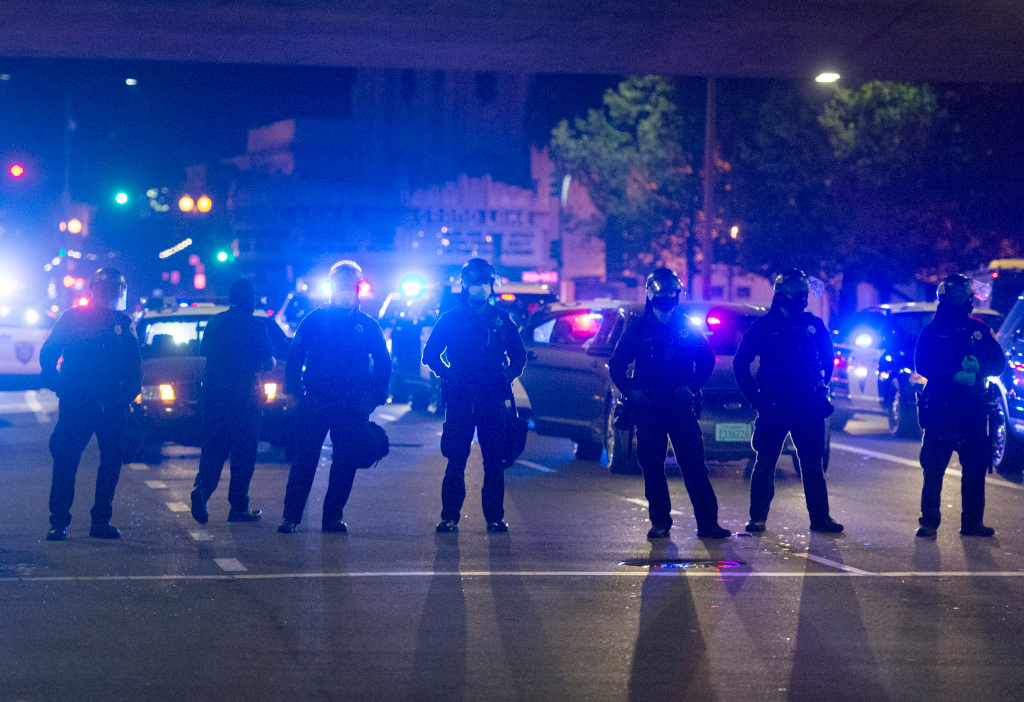On the final day of their legislative session Monday, California lawmakers are set to decide whether this summer’s protest movement against police brutality will translate to new legislation that toughens law enforcement accountability measures — or if opponents of those changes will beat back the latest attempts to rein in police power.
Some of the bills the state Senate and Assembly are expected to take up during marathon floor sessions Monday draw their inspiration directly from the police killing of George Floyd in Minneapolis, and what critics decried as a heavy-handed law enforcement response to the massive protests it sparked. Others have long been sought by activists and civil liberties groups, who say California has historically been too deferential to law enforcement.
Police officer unions and other law enforcement groups have strongly objected to many of the bills proposed in the wake of Floyd’s killing, charging that they are being rushed through the Legislature without due diligence.
These are some of the most significant pieces of police legislation that face key votes Monday.
‘Decertifying’ officers: California is one of only five states nationwide that doesn’t have a process to prevent police officers who have committed crimes or serious misconduct from continuing to work in law enforcement. SB731, from Sen. Steven Bradford, D-Gardena, would change that.
Bradford’s bill would create a new division within the state’s Commission on Peace Officer Standards and Training, which would investigate and determine whether to “decertify” officers who commit those offenses, essentially revoking their badges and preventing them from being rehired as officers elsewhere.
It would also roll back some of the legal protections known as “qualified immunity” that shield officers from being held liable in excessive force lawsuits. Police accountability groups charge those protections are a major obstacle to holding officers accountable.
Law enforcement groups have said they are open to creating a decertification process. But they are opposing Bradford’s bill, which they say goes too far, especially in limiting immunity protections.
Outside investigations of deaths: Many of those who have protested law enforcement killings in the Bay Area and across the country are skeptical that police rigorously investigate shootings and other deadly uses of force by their colleagues. They have also questioned whether local district attorneys, who determine whether uses of force were justified, can make that decision impartially given the close ties between prosecutors and police.
Under AB1506, those investigations and decisions would be taken out of local authorities’ hands. The bill would require the state attorney general to lead investigations into deaths at the hands of law enforcement, and to decide whether the officers involved acted legally or should face criminal charges. Proponents say that will give the public more faith that deadly police actions are being investigated fairly.
Law enforcement groups say the Department of Justice doesn’t have the resources to carry out those investigations. Attorney General Xavier Becerra has resisted some requests from local prosecutors to investigate police shootings recently; the department estimates the changes in AB1506 could cost $80 million per year or more.
Access to misconduct records: Two years after her legislation granted new public access to records relating to police shootings, sexual misconduct and dishonesty, Sen. Nancy Skinner, D-Berkeley, is looking to take that law a step further.
SB776 would require departments to turn over records relating to all uses of force, not just fatal incidents, as well as disciplinary actions that relate to racist, homophobic or otherwise discriminatory actions by officers. And it would toughen the disclosure requirements from Skinner’s 2018 law, with several provisions meant to force the hands of agencies that have resisted calls to turn over records.
Ban on neck restraints: George Floyd was far from the first civilian to die after police officers used the controversial tactic known as a carotid restraint. The technique is meant to quickly incapacitate a person by blocking the flow of blood to the brain through their carotid artery — but if it’s misapplied, particularly if a person is struggling with the officer, it can quickly turn fatal.
Gov. Gavin Newsom has already directed the state’s police training commission to no longer train officers to employ the carotid hold, and has called for legislation banning it, which AB1196 would do. Opponents in law enforcement say officers should have the option to use the carotid restraint if their lives are in danger.
Rubber bullet restrictions: Prompted by allegations that police excessively used rubber bullets and tear gas against protesters at racial justice demonstrations earlier this summer, AB66 would set strict new limits on when those tactics could be employed.
The bill would ban the use of tear gas outright, and would require that police only use kinetic-energy projectiles — the industry term for objects like rubber bullets and bean bag rounds — against specific targets posing imminent threats. The rounds could not be fired to disperse protests, or because demonstrators were violating curfews.
Proponents cite dozens of instances in which protesters were permanently injured by police projectiles during protests this summer. Police opposing the bill say that by removing what they consider an intermediate level of force, officers will have fewer options and will be more likely to use more severe physical force if protests turn violent.
Check back for updates from Monday’s votes.


















